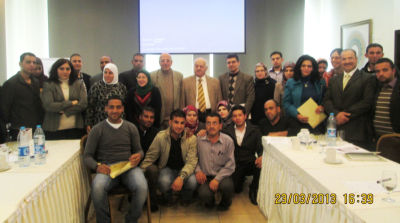The Applied Research Institute Jerusalem (ARIJ) and Palestinian Anti-Corruption Commission (PACC)
Bethlehem, March 26, 2013:– Good Governance Department (GG) at the Applied Research Institute Jerusalem (ARIJ) and Palestinian Anti-Corruption commission (PACC) delivered two trainings for social monitoring groups on the Palestinian anti-corruption law and the concept of social accountability.
Under the newly-signed MoU between ARIJ and PACC to adopt the Palestinian National Anti-Corruption Strategy, PACC staff trained forty members of the Pro-Poor Integrity (PPI) social monitoring groups on the anti-corruption legislation, the relation between anti-corruption and social accountability.
Pro-Poor Integrity (PPI) Program uses a social accountability approach to improve the way services are delivered, especially to the poor and most marginalized in the Palestinian cities . PPI’s approach is a community driven, collaborative problem-solving approach, focusing on integrity problems and solutions in public service delivery. PPI’s approach focuses on building capabilities, increasing responsiveness, increasing accountability and collecting evidence in public service delivery.
In addressing to the trainees, both Issac and Natsheh stressed the importance of their work as social monitors and their role in fighting corruption upwards. “We are proud to see the civil society becoming more engaged in the process of social monitoring in local services, which is crucial for the preservation of our national achievements” noted Dr. Jad Isaac General director of ARIJ in addressing the trainees.
Afterwards, ARIJ’s General Director Dr. Jad Issac and PACC commissioner Rafiq Natsheh handed the participants certificates of completion of the training.

